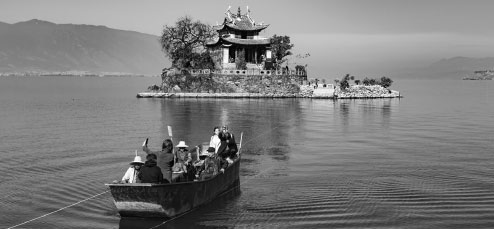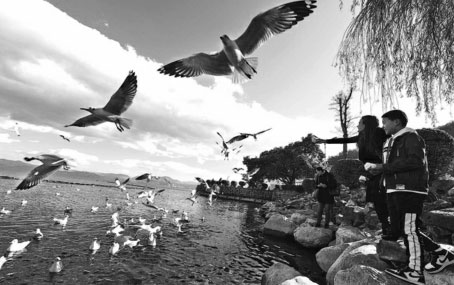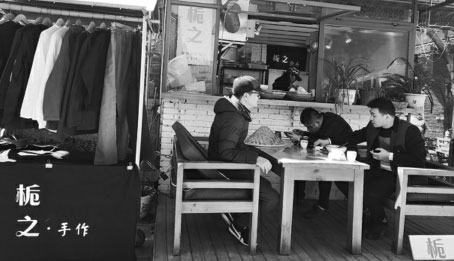Dream lifestyles in Dali end in disappointment
Some moves to idyllic lakeside city in Yunnan province end with a return home
"If you are not satisfied with your life and don't know why you have lost your smile; if you are unhappy and don't like being where you are, go west - with Dali your destination."
These lyrics form part of a song in the Chinese blockbuster movie Breakup Buddies, which was shot mostly in Dali, an attractive city in Yunnan province, and released in 2014.

The film inspired many middle-income earners tired of the hustle and bustle of urban life to quit their jobs in big cities and move to Dali.
However, unlike in Breakup Buddies, many people's dreams of finding a better life in Dali - which has provided the perfect backdrop for romantic trysts in hundreds of movies - have not had happy endings, and they are beginning to leave for a variety of reasons.
Chu Xiaogui, an author of popular books who moved to Dali from Beijing with her husband in December 2015, said she had since witnessed many friends leaving and returning to their hometowns.
As a professional writer, Chu has interviewed dozens of people from across the country who moved to Dali. She and her husband, who help organize activities such as gardening, hiking and cycling for newcomers, have a big circle of friends who have relocated to the city.
"People have different reasons for leaving, ranging from the need to take care of elderly parents who have stayed in their hometowns, to taking their children back to big cities for better education," she said.
People are also leaving because after two or three years without work, they need to find paid employment.
In recent years, thousands of people have moved to Dali from big cities. The exact number is not known, but a rough estimate from the local government shows that about 40,000 newcomers are living in the city.
Many people decided to leave their jobs and move to Dali from large cities such as Beijing, Shanghai and Guangzhou, capital of Guangdong province, due to work pressures and surging property prices, which have been hotly debated nationwide in recent years.
According to Chu, most of those moving to Dali are middle-income earners with higher-education backgrounds. "They are not billionaires, but they can afford to buy a house and live a decent life, even without a job, for three or five years," Chu said.
"Most important, they came to Dali with the idea of living a slow, simple, idyllic lifestyle that is different to that in the big cities. Some say their dreams have already come true, but others feel they made the wrong decision."
With an increasing number of newcomers arriving, Dali's tourism and real estate markets have prospered since 2015. According to the local government, 24 percent of property in the city was bought by new arrivals in 2015. Two years later, the number had risen to 60 percent.
Housing prices have surged from 6,392 yuan ($952 at the current rate) per square meter in December 2015 to 11,788 yuan per sq m in the same month last year.
A source at Yunnan Shili Real Estate Development Group, who requested anonymity, said more than 80 percent of the commercial property on its books in Dali had been bought by nonlocals.
Many people buy on impulse, as compared with housing prices in big cities, those in Dali are low, the source said, adding that she has seen some tourists buying property during their travels.
Heavily in debt
Wang Yan, a businesswoman from Chengdu, capital of neighboring Sichuan province, moved to Dali in 2014. She is among thousands of newcomers who operate guesthouses around Erhai Lake, which offers stunning views that provide an escape from urban life.
The 50-year-old, who now wants to leave the city and return to her hometown, said her decision to operate guesthouses in Dali had turned out to be a mistake, as it had left her heavily in debt.
She ran a garment company in Chengdu before moving to Dali, and the annual revenue from this business was about 400,000 yuan. She and her family lived quite a good life, she said.
Like many of her peers, Wang was attracted by the scenery around Erhai Lake, and used her capital to open a lakeside guesthouse business by leasing land from local farmers to build her own premises.
In 2014, she invested 6 million yuan in an 18-room guesthouse in Shuanglang township close to the lake.
Her business enabled her to live her dream; every morning she opened the windows, breathed clean air, and the surroundings were often bathed in sunshine, with beautiful flowers dotting the lake as waterfowl paddled on the surface.
However, in 2017, the local government ordered all 2,400-plus hotels, guesthouses and restaurants around the lake to close until they had been checked and the authorities confirmed they had all the permits required.
With the tourism industry expanding rapidly in Dali, wastewater and garbage were often found being disposed of directly into the lake due to insufficient or dilapidated facilities on the shore, creating one of the lake's major sources of pollution.
Since October, a widespread environmental campaign has escalated and more than 1,800 lakeside properties within the protection zone - including 540 guesthouses - have been demolished.
As the premises Wang operated were within the protection zone, which lies within 15 meters of the shoreline, they were demolished, and she will be compensated by local authorities. However, Wang said she does not believe the money can make up for her losses.
She has debts of 3 million yuan - mostly borrowed from relatives and friends. She said she regretted moving to Dali to pursue an idyllic life.
While some are not happy that they moved, others are glad they made the transition from big-city life.
Yang Yi, 48, who operates a restaurant in Dali's ancient walled city, arrived eight years ago from Chongqing after falling in love with the city on a visit. He bought a house and settled down.
"I have traveled to a lot of places, both at home and abroad, but I was overwhelmed by the natural beauty of Dali, a place that can calm you. I feel this city is the most pleasant one I have been to, and it is where my heart is now," Yang said.
For decades, many tourists have fallen in love with Dali's beautiful weather, stunning mountains, lakeside scenery and vibrant ethnic culture.
The city has abundant sunshine and a mild climate all year round. Tourists can explore the old town, hike amid the clouds, cycle around the lake and enjoy bustling street festivals.
Before he settled in Dali, Yang worked for a bank in Chongqing, his hometown. After moving, he started a business selling hand-made traditional costumes of the local Bai people, one of the ethnic groups in China. Many people from the group live in communities in Dali.
A year after he arrived, Yang opened his small restaurant, which serves spicy Chongqing cuisine. He has developed a close relationship with his customers.
"I cook the food on my own for my customers, most of whom are tourists. When I serve them, I often sit and chat with them and listen to their stories," he said.
"In my spare time, I go with friends to climb Mount Cangshan, or cycle around Erhai Lake alone. This is exactly the life that I want to live - having no pressure, but inner peace and freedom."
Smog a factor
Beijing resident Mu Yi moved to Dali after careful planning and visits to the city with his wife.
He said he decided to relocate 2,100 kilometers from the capital due to heavy smog, which had caused him serious discomfort. But more important, he wanted to change his way of life.
The 45-year-old worked for a State-owned company in Beijing before moving. Since 2001, he had been sent abroad by his company to work in countries such as Sudan, Ecuador, Iran, Syria and Iraq as chief manager for business development. However, he faced great pressure, both from work and security problems.
Mu said he had several narrow escapes from bomb attacks near his office in Iraq, where he worked for seven years.
When he returned to work at the company's Beijing headquarters in 2015, he found he could not adapt to life in the city. He had to travel for a total of three hours each day on the subway between home and work.
He also had a busy work schedule, and began to wonder what life meant to him, Mu said.
"I felt I needed a change, so I talked with my wife. She agreed with me that we should sell our house in Beijing and move to somewhere we liked," he said.
The couple searched online and drew up plans to move, finally deciding on Dali, where they bought a villa on an estate at the foot of Mount Cangshan.
In May 2017, Mu left his job and traveled with his wife and son to their new home.
He said he is happy with his new life. "The lifestyle in Dali is slow, easygoing and totally relaxed. There are no business phone calls, as there always were in Beijing. This is 100 percent the life I dreamed of," he said.
Mu is trying to find something he enjoys to begin a new career. "I don't intend to take up a job to make money - I want to find something I truly love doing to enrich my life," he said. "Since I decided to move to Dali, making money is no longer a priority."
Chu, the author, said she and her husband enjoy their new life. They have their own property and a business in Dali. She gave birth to a daughter last year, which has made life busier.
She said Dali is a good place for her to get to know more people from across the country.
Many of the nonlocals who have chosen to remain in Dali, which also attracts considerable numbers of foreigners, believe their new lives are good.
"Maybe someday when my daughter is of school age we might go back to Beijing. But who knows?" Chu said.
Mu said, "I don't know what will happen in two or three years time or beyond, but now is the best time for me and my family."
Yang, the restaurant owner, said: "I will always be here in Dali. When you are enjoying the best time of your life, why bother thinking of the future?"
caodesheng@chinadaily.com.cn
|
Erhai Lake offers stunning scenery.Chen Ruoque And Zhang Shulu / For China Daily |
|
|
|
Diners enjoy a leisurely meal at Yang Yi's restaurant in Dali.Cao Desheng / China Daily |
(China Daily 03/26/2019 page2)





















